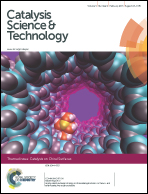Tailoring the selectivity of glycerol oxidation by tuning the acid–base properties of Au catalysts†
Abstract
Supported gold nanoparticles are very effective catalysts for the selective oxidation of glycerol which represents an important bio-derived feedstock. In this paper we report that the acid/base properties, especially the acid site density, of these catalysts are the key factor in tuning the selectivity. A range of supported AuPt catalysts have been prepared by sol immobilization using acidic (H-mordenite, SiO2, MCM-41, and sulfated ZrO2) and basic (NiO and MgO) oxides as supports. In particular, using MCM-41 as the support, a high selectivity to glyceraldehyde, an important labile intermediate, was found.


 Please wait while we load your content...
Please wait while we load your content...